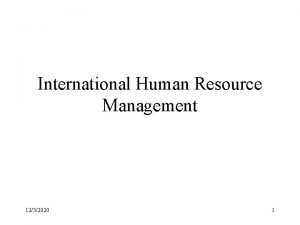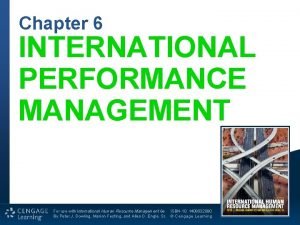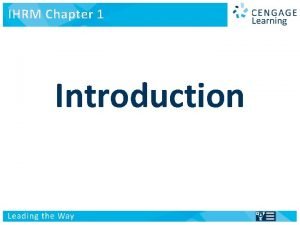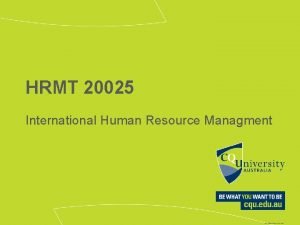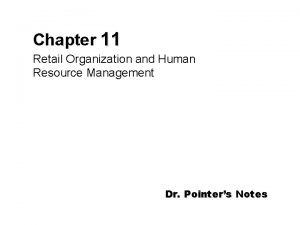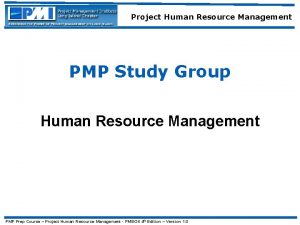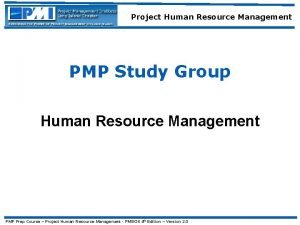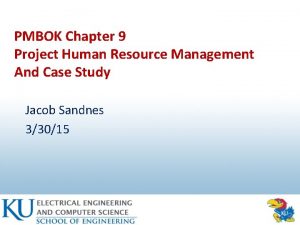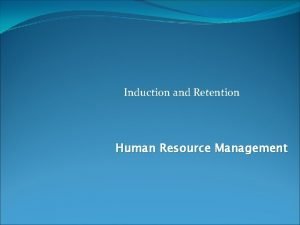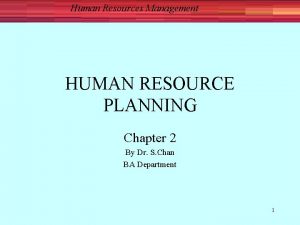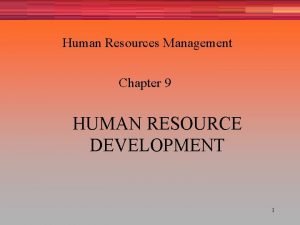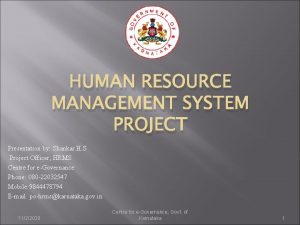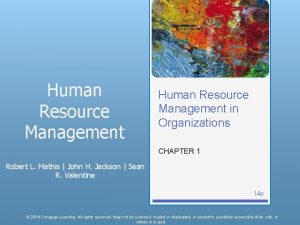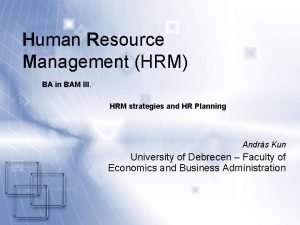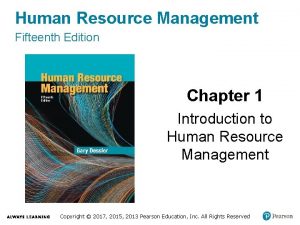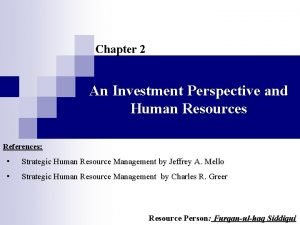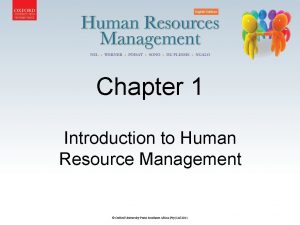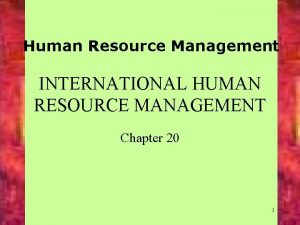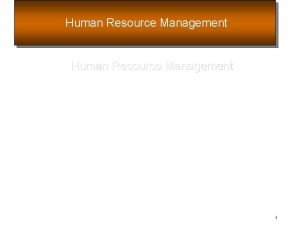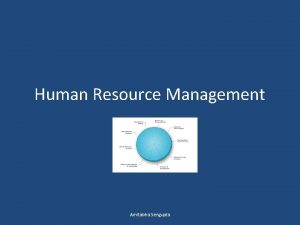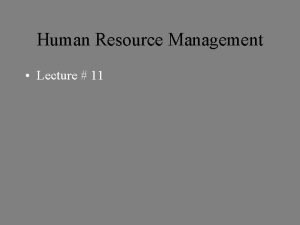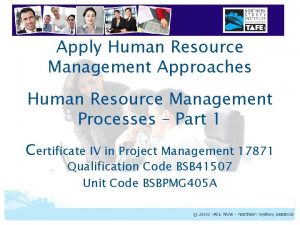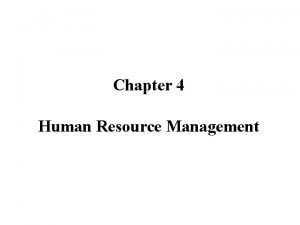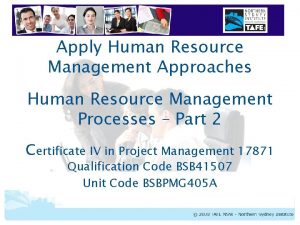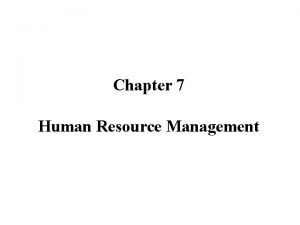International Human Resource Management 1232020 1 Definition Human



































- Slides: 35

International Human Resource Management 12/3/2020 1

Definition • Human resource management (HRM) is the set of activities directed at attracting, developing, and maintaining the effective workforce necessary to achieve a firm’s objectives. Recruiting and selecting employees, providing training and development, appraising performance, and providing compensation and benefits are all part of HRM. 12/3/2020 2

Complications for IHRM compared to HRM • International HR managers face a more complex task than their domestic counterparts because differing cultures, levels of economic development, and legal systems among countries may require companies to adapt their hiring, firing, training, and compensation programs to each country. 12/3/2020 3

Complications for IHRM compared to HRM • Firms must decide whether managers will be selected from the home country, from the host country or from third countries. • Training and development in an international firm may be more complex than in a domestic firm. • Compensation systems must be adapted to meet the needs of each country’s labor market. 12/3/2020 4

Strategic Significance • The international HRM process involves understanding the strategic context of HRM within the firm’s overall strategy, recruiting and selecting appropriate managerial personnel, providing necessary training and development, assessing performance, providing compensation, and evaluating managerial retention and turnover. 12/3/2020 5

International Managerial Staffing Needs • There are two broad categories of staffing needs facing international human resource managers: (1) recruiting, training, and retaining managerial and executive employees; and (2) recruiting, training, and retaining non managerial employees such as blue-collar production workers and whitecollar office staff. 12/3/2020 6

International Managerial Staffing Needs • For non managerial employees, international firms normally adapt their compensation and performance appraisal systems to local laws, customs, and cultures. 12/3/2020 7

International Managerial Staffing Needs • Most firms begin their international expansion with small-scale exporting. Thus, during a firm’s initial foray into foreign markets a home-country citizen, who may or may not have special training in working in foreign markets, usually manages the firm’s international transactions. 12/3/2020 8

International Managerial Staffing Needs • Later when the firm establishes an international department, subsidiary managers (usually host country citizens) report to the vice-president of the international division (usually a home country citizen). 12/3/2020 9

International Managerial Staffing Needs • As a firm further expands its operations in a global organization, a team of managers with expertise in the firm’s product lines, necessary functional skills, individual country markets, and the firm’s global strategy is usually assembled. 12/3/2020 10

International Managerial Staffing Needs • Firms that centralize decision making at headquarters typically favor home-country managers while firms that decentralize decision making to the subsidiary level often employ host country nationals. Since most companies do not fall at one extreme or the other, most companies have a combination of both home and host country managers. 12/3/2020 11

International Managerial Staffing Needs • Managers can be hired from three groups: parent country nationals; host country nationals; and third country nationals. Parent country nationals (PCNs) are residents of the international business’s home country who are transferred to one of its foreign operations. 12/3/2020 12

International Managerial Staffing Needs • Communications and coordination with corporate headquarters is typically facilitated when PCNs are employed because they normally share a common culture and education background with headquarters’ staff. 12/3/2020 13

International Managerial Staffing Needs • PCNs may however, lack knowledge of local laws, culture, economic conditions, social structure, and political processes. Moreover, they may be expensive to relocate and maintain the host country. In addition, because a host country may impose restrictions on the number of employees that can be transferred, a company may not have the freedom to hire whom it wants. 12/3/2020 14

International Managerial Staffing Needs • Host country nationals (HCNs) are residents of the host country, and are the most common choice for mid-level and lower-level jobs. Employing HCNs is popular because they are already familiar with local laws, culture, and economic conditions. 12/3/2020 15

International Managerial Staffing Needs • Also, HCNs may be cheaper than PCNs because a firm can avoid the costs such as relocation expenses that are associated with PCNs. • However, an HCN may not be familiar with the firm’s corporate culture nor its business practices. 12/3/2020 16

International Managerial Staffing Needs • Third country nationals (TCNs) are citizens of neither the firm’s home country nor of the host country. TCNs are most likely to employed in upper-level or technical positions. TCNs and PCNs are collectively known as expatriates (people working and residing in countries other than their native country). 12/3/2020 17

Ethnocentric policy • Key management positions filled by parentcountry nationals • Advantages: – Overcomes lack of qualified managers in host nation – Unified culture – Helps transfer core competencies (and skills back) • Disadvantages: – Produces resentment in host country – Can lead to cultural myopia 12/3/2020 18

Polycentric policy • Host-country nationals manage subsidiaries • Parent company nationals hold key headquarter positions • Best suited to multi-domestic businesses • Advantages: – Alleviates cultural myopia. – Inexpensive to implement – Helps transfer core competencies • Disadvantages: – Limits opportunity to gain experience of host-country nationals outside their own country. – Can create gap between home-and host-country operations 12/3/2020 19

Geocentric policy • Seek best people, regardless of nationality – not always possible • Best suited to Global and trans-national businesses • Advantages: – Enables the firm to make best use of its human resources – Equips executives to work in a number of cultures – Helps build strong unifying culture and informal management network • Disadvantages: – National immigration policies may limit implementation – Expensive to implement due to training and relocation – Compensation structure can be a problem. 12/3/2020 20

Necessary Skills and Abilities for Intl Managers 12/3/2020 21

Recruitment & Selection • Today, as businesses globalize, the market for executive talent is also globalizing. Top management teams are increasingly diverse in their members. • While most MNCs do not hire new college graduates to take foreign positions immediately, many hire graduates with the intention of sending them abroad in the future. 12/3/2020 22

Recruitment & Selection • The selection process in international firms is particularly important because of the high cost of expatriate failure. Expatriate failure is the early return of an expatriate manager to his or her country because of an inability to perform in the overseas assignment. 12/3/2020 23

Recruitment & Selection • Expatriate failure rates may be as high as 20 -50 percent in many U. S. companies, higher than for either European or Japanese companies. 12/3/2020 24

Recruitment & Selection • Managers sent on foreign assignments may experience culture shock, a psychological phenomenon that may lead to feelings of fear, helplessness, irritability, and disorientation. Acculturation typically proceeds through four phases. 12/3/2020 25

• Because an expatriate suffering from culture shock may be less effective and productive, companies typically take measures to limit its effects such as providing pre-departure language and cultural training. 12/3/2020 26

Phases in Acculturation 12/3/2020 27

Recruitment & Selection • In most cases, expatriates fail to complete their foreign assignments because of an inability of the expatriate manager, or his or her spouse and family, to adapt to the new location. 12/3/2020 28

Recruitment & Selection • Firms are now beginning to pay more attention to repatriation--bringing a manager back home after a foreign assignment has been completed. Individuals that successfully adapted to the foreign environment may experience culture shock upon returning to their own country. 12/3/2020 29

Recruitment & Selection • Regarding “non-cultural” issues leading to success or failure overseas, managers tend to be more successful in foreign assignments when 5 conditions are met: – 1. they can freely decide whether or not to accept a foreign assignment – 2. they have a realistic understanding of the new job and assignment 12/3/2020 30

Recruitment & Selection – 3. they have a realistic expectation of a repatriation assignment – 4. they have a mentor in the parent firm who will look out for their careers – 5. there is a clear link between the foreign assignment and the manager’s long-term career path. 12/3/2020 31

Recruitment & Selection • Compensating expatriate managers can be a complex process because factors such as differences in currency valuation, standards of living, lifestyle norms, and so forth must be taken into consideration. 12/3/2020 32

Recruitment & Selection • A cost-of-living allowance may be given to managers to offset differences in the cost-of -living in the home and host countries. A hardship premium (also known as a foreign service premium) may be paid to mangers who accept assignments in relatively unattractive locations. 12/3/2020 33

Recruitment & Selection • Special benefits packages that may be provided to expatriate managers include housing, education, medical treatment, travel to the home country, and club memberships. The text provides specific examples of how and why firms provide these benefits. 12/3/2020 34

Recruitment & Selection • In many cases the total compensation package offered to an expatriate is much more lucrative than the package offered to his or her local counterpart. 12/3/2020 35
 Define personnel management
Define personnel management Positional traction
Positional traction International human resource management dowling 6th edition
International human resource management dowling 6th edition International human resource planning
International human resource planning International human resource management
International human resource management Time management human resources
Time management human resources Organized retail
Organized retail Literal sense in hrm
Literal sense in hrm Introduction to hrm
Introduction to hrm Introduction to human resource management
Introduction to human resource management Project management human resources
Project management human resources Project human resource management pmbok ppt
Project human resource management pmbok ppt Pmbok human resource management
Pmbok human resource management Human resource management why is it important
Human resource management why is it important Restaurant human resources
Restaurant human resources Induction definition in hrm
Induction definition in hrm Human resource management chapter 2
Human resource management chapter 2 Chapter 9 human resource management
Chapter 9 human resource management Hrms shanker group
Hrms shanker group Performance appraisal in human resource management
Performance appraisal in human resource management Current issues in human resource management
Current issues in human resource management Ba human resource management
Ba human resource management Identify job vacancy
Identify job vacancy Human resources management gaining a competitive advantage
Human resources management gaining a competitive advantage Human resource management gaining a competitive advantage
Human resource management gaining a competitive advantage Human resource management gaining a competitive advantage
Human resource management gaining a competitive advantage Human resources management exam questions and answers pdf
Human resources management exam questions and answers pdf Human resource management fifteenth edition
Human resource management fifteenth edition Human resource management lecture chapter 1
Human resource management lecture chapter 1 Human resource management by gary dessler 11th edition
Human resource management by gary dessler 11th edition Strategic human resource
Strategic human resource Utilitarian organization
Utilitarian organization Chapter 11 human resource management
Chapter 11 human resource management Chapter 1 introduction to human resource management
Chapter 1 introduction to human resource management Human resources management chapter 1
Human resources management chapter 1 Applied psychology in human resource management
Applied psychology in human resource management
